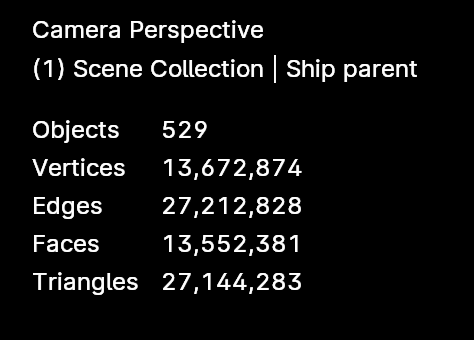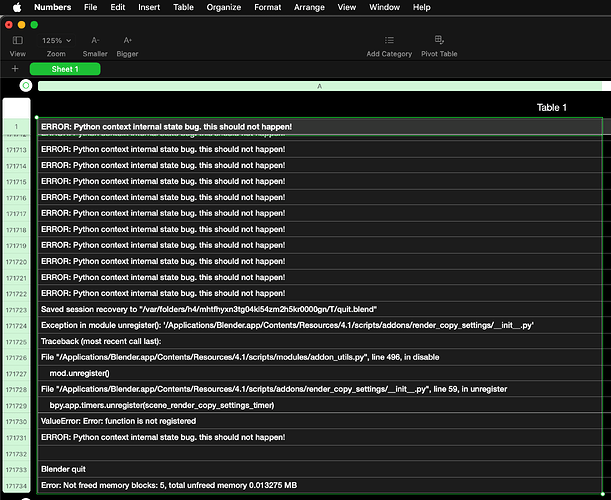For the past few months I’ve been leaving Blender rendering a project rendering overnight in my Mac Studio M1 Ultra. This project crashes at random about half the nights, and that would be about two months of rendering almost every single night.
Making it much harder to troubleshoot is that sometimes it crashes after a few frames, sometimes after dozens of frames, and sometimes not at all.
The macOS crash log for Blender is gigantic, but I’ve read that the important stuff is near the top, so here it is:
Process: Blender [46245]
Path: /Applications/Blender.app/Contents/MacOS/Blender
Identifier: org.blenderfoundation.blender
Version: 4.1.0 (4.1.0 2024-03-26)
Code Type: ARM-64 (Native)
Parent Process: launchd [1]
User ID: 501
Date/Time: 2024-04-20 03:16:50.8493 -0400
OS Version: macOS 14.4.1 (23E224)
Report Version: 12
Anonymous UUID: 55AF7720-02C9-926E-C7DA-7319E4A60559
Time Awake Since Boot: 470000 seconds
System Integrity Protection: enabled
Crashed Thread: 63
Exception Type: EXC_BAD_ACCESS (SIGSEGV)
Exception Codes: KERN_INVALID_ADDRESS at 0x910043fda9017c05 -> 0x000043fda9017c05 (possible pointer authentication failure)
Exception Codes: 0x0000000000000001, 0x910043fda9017c05
Termination Reason: Namespace SIGNAL, Code 11 Segmentation fault: 11
Terminating Process: exc handler [46245]
VM Region Info: 0x43fda9017c05 is not in any region. Bytes after previous region: 74256780196870 Bytes before following region: 30796375032827
REGION TYPE START - END [ VSIZE] PRT/MAX SHRMOD REGION DETAIL
MALLOC_MEDIUM 7460000000-7468000000 [128.0M] rw-/rwx SM=PRV
---> GAP OF 0x5f8b98000000 BYTES
MALLOC_NANO 600000000000-600020000000 [512.0M] rw-/rwx SM=PRV
And it starts listing all the threads, until it gets to 63, which is the one that crashed and it shows all this:
Thread 63 Crashed:
0 libtbb.dylib 0x10d43aacc void tbb::internal::generic_scheduler::propagate_task_group_state<unsigned long>(unsigned long tbb::task_group_context::*, tbb::task_group_context&, unsigned long) + 192
1 libtbb.dylib 0x10d43a3d0 bool tbb::internal::market::propagate_task_group_state<unsigned long>(unsigned long tbb::task_group_context::*, tbb::task_group_context&, unsigned long) + 240
2 libtbb.dylib 0x10d43a2dc tbb::task_group_context::cancel_group_execution() + 140
3 libtbb.dylib 0x10d438130 tbb::internal::custom_scheduler<tbb::internal::IntelSchedulerTraits>::local_wait_for_all(tbb::task&, tbb::task*) + 412
4 libtbb.dylib 0x10d435ac8 tbb::internal::generic_scheduler::spawn_root_and_wait(tbb::task&, tbb::task*&) + 224
5 libembree4.dylib 0x10e62bbfc embree::AccelN::accels_build() + 228
6 libembree4.dylib 0x10e670824 embree::Scene::build_cpu_accels() + 1100
7 libembree4.dylib 0x10e670c4c embree::Scene::commit_task() + 528
8 libembree4.dylib 0x10e673154 tbb::interface9::internal::start_for<tbb::blocked_range<unsigned long>, tbb::internal::parallel_for_body<embree::Scene::commit(bool)::$_4::operator()() const::'lambda'()::operator()() const::'lambda'(unsigned long), unsigned long>, tbb::auto_partitioner const>::execute() + 1092
9 libtbb.dylib 0x10d4389c0 tbb::internal::custom_scheduler<tbb::internal::IntelSchedulerTraits>::process_bypass_loop(tbb::internal::context_guard_helper<false>&, tbb::task*, long) + 428
10 libtbb.dylib 0x10d438058 tbb::internal::custom_scheduler<tbb::internal::IntelSchedulerTraits>::local_wait_for_all(tbb::task&, tbb::task*) + 196
11 libtbb.dylib 0x10d435ac8 tbb::internal::generic_scheduler::spawn_root_and_wait(tbb::task&, tbb::task*&) + 224
12 libembree4.dylib 0x10e672cd8 tbb::internal::function_task<embree::Scene::commit(bool)::$_4::operator()() const::'lambda'()>::execute() + 144
13 libtbb.dylib 0x10d4389c0 tbb::internal::custom_scheduler<tbb::internal::IntelSchedulerTraits>::process_bypass_loop(tbb::internal::context_guard_helper<false>&, tbb::task*, long) + 428
14 libtbb.dylib 0x10d438058 tbb::internal::custom_scheduler<tbb::internal::IntelSchedulerTraits>::local_wait_for_all(tbb::task&, tbb::task*) + 196
15 libembree4.dylib 0x10e672a78 tbb::internal::task_group_base::wait() + 40
16 libembree4.dylib 0x10e672a38 tbb::internal::wait_delegate::operator()() const + 24
17 libtbb.dylib 0x10d426890 tbb::interface7::internal::isolate_within_arena(tbb::interface7::internal::delegate_base&, long) + 92
18 libembree4.dylib 0x10e672bbc std::__1::__function::__func<embree::Scene::commit(bool)::$_4, std::__1::allocator<embree::Scene::commit(bool)::$_4>, void ()>::operator()() + 132
19 libembree4.dylib 0x10e670ed4 embree::Scene::commit(bool) + 156
20 libembree4.dylib 0x10e63d20c rtcCommitScene + 52
21 Blender 0x104ab9d6c ccl::BVHEmbree::build(ccl::Progress&, ccl::Stats*, RTCDeviceTy*, bool) + 476
22 Blender 0x104ac82f8 ccl::CPUDevice::build_bvh(ccl::BVH*, ccl::Progress&, bool) + 144
23 Blender 0x104acb2b4 ccl::MultiDevice::build_bvh(ccl::BVH*, ccl::Progress&, bool) + 744
24 Blender 0x104c809a0 ccl::GeometryManager::device_update_bvh(ccl::Device*, ccl::DeviceScene*, ccl::Scene*, ccl::Progress&) + 648
25 Blender 0x104c7b408 ccl::GeometryManager::device_update(ccl::Device*, ccl::DeviceScene*, ccl::Scene*, ccl::Progress&) + 4228
26 Blender 0x104d04760 ccl::Scene::device_update(ccl::Device*, ccl::Progress&) + 1504
27 Blender 0x104d064b0 ccl::Scene::update(ccl::Progress&) + 148
28 Blender 0x104df4288 ccl::Session::run_update_for_next_iteration() + 1248
29 Blender 0x104df3908 ccl::Session::run_main_render_loop() + 120
30 Blender 0x104df47f0 ccl::Session::thread_render() + 252
31 Blender 0x104df268c ccl::Session::thread_run() + 164
32 Blender 0x104f193a0 ccl::thread::run(void*) + 28
33 libsystem_pthread.dylib 0x18de6ef94 _pthread_start + 136
34 libsystem_pthread.dylib 0x18de69d34 thread_start + 8
It goes all the way to thread 89, then another reference to thread 63:
Thread 63 crashed with ARM Thread State (64-bit):
x0: 0x0000000000000001 x1: 0x0000000000000001 x2: 0x000000011ca8cf38 x3: 0x0000000000000001
x4: 0x0000600018c85c00 x5: 0x0000000000003380 x6: 0x000060000135f380 x7: 0x000060000aa54f00
x8: 0x000000011ca8cf28 x9: 0x0000000147752f48 x10: 0x910043fda9017bfd x11: 0x0000000000633a00
x12: 0x00000071c2800028 x13: 0x00000000ffff8030 x14: 0x0000000000000c00 x15: 0x00000000ffff7dff
x16: 0x000000018de9f720 x17: 0x00006000009b0c30 x18: 0x0000000000000000 x19: 0x000000011ca8ce00
x20: 0x0000000000000001 x21: 0x000000078cb49548 x22: 0x0000000000000078 x23: 0x0000000147752f58
x24: 0x0000000000000000 x25: 0x0000000000000001 x26: 0x000000011ca8cf38 x27: 0x0000000000000001
x28: 0x00000000ffffff00 fp: 0x000000078cb493b0 lr: 0x000000010d43aaa0
sp: 0x000000078cb49350 pc: 0x000000010d43aacc cpsr: 0xa0001000
far: 0x910043fda9017c05 esr: 0x92000005 (Data Abort) byte read Translation fault
There’s a lot more than that, but those lines in the log seem to be the ones related to this.
Now, doesn’t Blender have its own error log? Or anything that will give me a better idea as to why it’s crashing so often, and why it isn’t a specific frame or anything that’s triggering that error?


